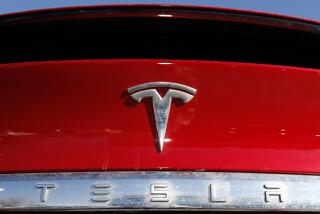Toyota puts spate of lawsuits in rearview mirror but faces many more
Toyota has spent well over $1 billion settling lawsuits involving unintended acceleration, but the worldâs largest automaker still faces hundreds of other cases awaiting trial.
First up is a suit filed by the heirs of Noriko Uno, a 66-year-old bookkeeper who was killed when her Toyota Camry unexpectedly sped to 100 mph on a city street in Upland in 2009.
Jury selection started Monday in the Los Angeles County Superior Court lawsuit that argues Toyota Motor Corp. should have had a fail-safe system that enables the brakes to override the accelerator. A judge has selected the case as a bellwether case that will help set the direction for hundreds of similar lawsuits against the automaker.
Opening arguments in the suit are expected to start next week, and the trial could last well into October, according to attorneys.
âLots of people are tracking these cases,â said Aaron Jacoby, a Los Angeles attorney who heads the automotive industry group at the Arent Fox law firm. âThese sorts of cases build precedent.â
There is also still a chance the lawsuit wonât reach a jury.
âThere will be some form of a settlement,â predicted Thilo Koslowski, an analyst at Gartner Inc. âFor Toyota, it might be an investment to not have this flare up into something bigger.â
Toyota has settled numerous other sudden acceleration cases, including a pair of suits in Michigan in 2011 just days away from trial. The automaker settled the most notorious acceleration case â involving a California Highway Patrolman who was killed along with his family â for $10 million in late 2010. In late December and early January, the automaker settled the first two bellwether cases scheduled for trial.
It also settled a class-action suit filed by people contending that defects hurt the value of their cars, agreeing to pay as much as $1.6 billion. That settlement was finalized by a federal judge in Orange County last week.
Toyota has brought one case to verdict, involving a Scion tC in New York in 2011. The automaker won, but plaintiffsâ lawyers in other suits say the case was weak and involved a different set of facts than most sudden acceleration allegations.
California state court rules may make the Uno case more likely to be settled. Plaintiffs in California have to convince only nine of 12 jurors to rule in their favor; federal jury verdicts must be unanimous.
Other litigation has focused on whether there is an electronic defect that triggers unexpected acceleration in some Toyota cars. But the attorney for the heirs of Uno doesnât intend to prove the cause. Instead, attorney Garo Mardirossian will try to show that the Japanese automaker was negligent because it failed to include a brake override system in the car. Such systems shut off acceleration when the brake pedal is depressed.
A brake override, the plaintiffs will argue, would have helped Uno stop her 2006 Camry before it careened into a telephone pole and a tree.
Many automakers, including Nissan, Volkswagen, Chrysler and BMW, had adopted brake override technology by the early part of the last decade, but Toyota had not.
Although documents show that Toyota discussed brake override with federal safety regulators in 2007, it did not start using the fail-safe until 2010, during its recalls of millions of cars for sudden acceleration problems. All new vehicles made by Toyota today include the safety feature.
But the National Highway Traffic Safety Administration is generally considered the final word on what safety features automakers must include in their vehicles, said Logan Robinson, former assistant general counsel for Chrysler group.
âJust because your competitors have something in place doesnât necessarily make you negligent,â said Robinson, who teaches law at the University of Detroit Mercy.
In recent years, NHTSA has mandated that cars get anti-lock brakes and electronic stability control systems. The agency is considering ordering manufacturers to make backup cameras standard. Last year, NHTSA proposed a rule to make brake override systems mandatory in vehicles sold in the U.S., but it has yet to issue a final regulation.
Toyota still faces roughly 300 personal injury and death lawsuits related to sudden acceleration in state and federal courts. The first federal bellwether case â involving an elderly Georgia woman whose Camry raced through a schoolyard before crashing into a wall â is scheduled to begin in November in Santa Ana. The driver, Ida Starr St. John, was not killed but has since died; her attorneys have contended the accident led to her death.
Two other California cases are scheduled for next year. Lawyers involved in those suits have suggested that they may try to convince juries that Toyota vehicles have internal electronic defects that can cause sudden acceleration.
But that could be a higher hurdle. Investigations by the National Highway Traffic Safety Administration, NASA and the National Academy of Sciences found no flaws in the automakerâs electronics that could provoke the problem.
Toyota has largely rebuilt an image damaged by the spate of sudden acceleration incidents and recalls.
In 2009, Toyota accounted for 17% of U.S. auto sales. But Toyotaâs market share plunged following the high-profile accident that killed off-duty Highway Patrol Officer Mark Saylor and three members of his family near San Diego.
That crash led to a safety investigation and recall of millions of Toyota and Lexus vehicles to fix a problem with floor mats that interfered with the gas pedal. After a Los Angeles Times series on unintended acceleration, Toyota took the extremely rare step of halting all sales of its vehicles in the U.S. The automaker ultimately issued millions more recall notices to fix sticking gas pedals and other issues. In the last three years, Toyota has paid federal fines of nearly $70 million for failing to promptly inform regulators of defects and for delaying recalls.
But recently, Toyota seems to have put the scandals in the rearview mirror. Consumers either shrugged off or ignored the recalls and alleged incidents of unexpected acceleration. Toyotaâs Camry remains the bestselling sedan in America. The automaker will soon start selling a redesigned Corolla, another top seller, that was aging and badly needed a remake. Meanwhile, the Prius has defied skeptics of hybrid vehicles to become the top-selling car in California.
A prominent trial and allegations surrounding Unoâs crash and death could reverse that success, said Jack Nerad, analyst at car information company Kelley Blue Book.
âIt will cause some buyers to think twice about considering Toyota,â Nerad said. âIt means Toyotaâs name will be in the news in a negative way.â
Twitter: @LATimesJerry
Twitter: @kenbensinger
More to Read
Inside the business of entertainment
The Wide Shot brings you news, analysis and insights on everything from streaming wars to production â and what it all means for the future.
You may occasionally receive promotional content from the Los Angeles Times.










